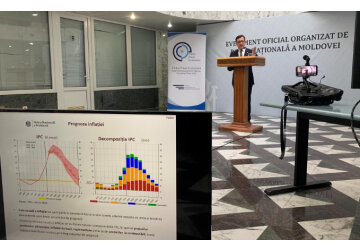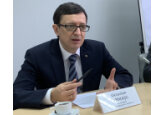
The war in Ukraine and the rise in world prices for energy resources and food have seriously affected the Moldovan economy and provoked an increase in inflation in the country, - Octavian Armasu.
This was stated by the head of the National Bank, presenting the second this year's Inflation Review. He stated that the inflation rate for the last 12 months was 27.1%. The reason was the war in Ukraine and the increase in world prices for energy and food. At the same time, he noted that inflation in the current circumstances in Moldova is much higher than in other countries, for a number of internal reasons: a large share of food in the consumer basket, a small and open economy, a serious imbalance in the economy caused by an untimely increase tariffs (for electricity, heating, transport services, etc.). According to the National Bank, from January 2010 to October 2021, the average monthly growth of regulated tariffs in Moldova amounted to 0.3%. “This means that the increase in many tariffs has been held back artificially for many years. And now, in the context of a significant increase in energy prices, regulators are forced to raise tariffs. Thus, in November 2021, tariffs increased by 10%, in December - by 1.3%, and since the beginning of 2022 they have increased monthly: in January - by 3.4%, in February - by 0.5%, in March - by 3.6%, in April - by 16.3%,” the President of the National Bank said. Octavian Armasu also explained why inflation in Moldova is higher than, for example, in Ukraine or Russia. “After the start of the war, the Ukrainian authorities took a number of measures - they established an administrative fixing of the exchange rate and prices for a wide range of goods. Accordingly, the immediate impact of the war, at least at the statistical level, in Ukraine is not so significant. After the end of the war, these measures will be lifted, and the exchange rate and prices will be brought into line with market prices, and then inflation in Ukraine can be adjusted. It all depends on how the Ukrainian National Bank will act,” Armasu said, stressing that prices and the exchange rate in Moldova are not regulated, but are set freely by the market, so any external fluctuations are reflected in inflation. As for Russia, as Armasu noted, the Russian Federation is a major world exporter of oil products and uses the available reserves, which allows it to temporarily maintain a certain stability. “But such artificial stability cannot continue indefinitely. The continuation of sanctions and economic blocking will sooner or later affect the economy of the Russian Federation,” the President of the NBM said. // 13.05.2022 — InfoMarket







